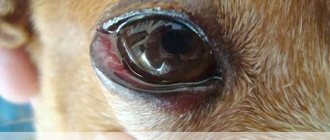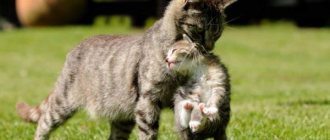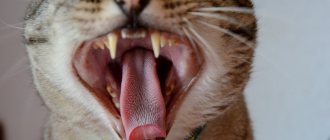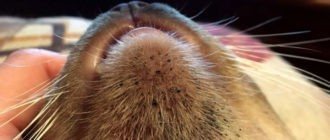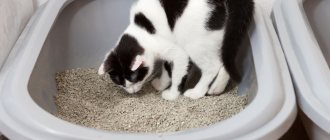If a cat hisses at a kitten or person and snorts, then in a similar way the pet may be showing aggression or fear. A cat getting angry and rushing when defending its own territory, or aggressive behavior towards its owner may be a sign of resentment. This condition in an animal should not be left unattended, since hissing is often one of the symptoms of a serious illness. Therefore, as soon as the cat becomes aggressive and starts hissing, it is recommended to contact a veterinary clinic.
Signs
Typically, a cat hisses when it is afraid of other animals or people. But traditionally it is believed that in this way she shows aggression, she can even rush and attack.
When an animal makes such sounds, it becomes tense, bends its back, tail, and may press its ears. What does a hissing cat usually look like?
- His fur instantly stops being tousled , it seems that it has turned from smooth to fluffy, voluminous. Visually, the cat even looks larger at such a moment.
- When a cat is angry, his back arches . This pose is a signal that the animal can and will rush at the offender or someone who, in his opinion, poses a danger.
- The ears are flattened for a reason. They talk about distrust of those around them. It is also a kind of protection for the head from injury.
- An expressive look conveys all the emotions of a cat - courage, aggressiveness, determination. Meowing may also be heard along with the hissing, but it does not make the disheveled cat any cuter. On the contrary, the sounds complement the appearance and confirm the readiness to stand up for oneself and even rush at a person.
The owner of the animal, having studied its habits, will be able to figure out when a cat hisses because of a sense of danger, and when because of a feeling of aggression.
Mechanism of cat hissing
Hissing is a vibration produced by the vocal muscles located in the lower region of the larynx. The sounds are produced during forced exhalation, when the individual moves the lower jaw forward and extends the tongue.
All representatives of the cat family are capable of producing such guttural sounds, but only some breeds can growl or roar. For example, the British, Sphynxes, Maine Coons do not just hiss, but growl very loudly, expressing negative emotions.
A negative reaction is also confirmed by external signs demonstrating irritation and an outburst of emotions. At the moment of aggression, the fluffy:
- opens his mouth, showing a fighting grin;
- presses ears tightly to head;
- pushes his mustache forward;
- closes his eyes, while clearly focusing his gaze;
- raises the fur on the withers, tail and along the ridge.
At this time, the animal’s pupils dilate and occupy almost the entire iris. The pet's gaze expresses the entire emotional state. An owner who has carefully studied the habits of his mustachioed friend will be able to explain the specific reaction without difficulty.
Kids begin to show character quite early, thereby expressing their feelings. Kittens make guttural sounds, but weak vocal muscles make them unclear and sound more cute than scary. Their hissing does not come out at all - only the sound of exhalation is obtained.
Causes
Cats do not like to be teased, take away their food, try to suppress them, and pester them with unnecessary affection.
That’s why they hiss in such a situation and show their displeasure with their eyes.
ATTENTION! But sometimes it is completely unclear why a pet hisses at its owner; it would seem that he does it for no reason, which is even more alarming.
If a cat has such aggressive behavior, you still need to study the situation, something is causing this behavior:
- Cats do not like the smell of alcohol from people ; when they hear this unpleasant aroma close to them, they can hiss and show their teeth in a threatening roar.
- For some cats, aggressiveness is a character trait. After all, both people and animals are individual and have their own characteristics. A family may get a cat who will hiss even at the owner who feeds her and pampers her with goodies. That's how it's built.
- Street fights between cats, during which they hiss at each other, arching their backs and arching their tails, are common. This is how they establish their supremacy, mark and defend their territory . How else can a cat threaten his opponent?
- When people bring a new pet into their home, a cat that considers itself an old-timer may initially react aggressively to the newcomer. She will hiss every time she sees him around. This is an expression of dissatisfaction, jealousy, and much more. But over time, relations should smooth out.
- behavior of a cat protecting its babies is considered natural . Even if a person or a huge dog poses a threat, the cat can not only hiss, but also rush at the offender. Hissing at the moment of danger is the result of maternal instinct.
- Many cats do not like small children , especially if they scream loudly, make noise, or cry loudly.
If there is a baby in the house whose noise irritates the pet, he may hiss at the child. This does not necessarily mean that the cat will attack the baby after a certain moment; often over time the child makes less noise and the animal gets used to it. But parents still need to observe the relationship of this couple for some time.
But you need to take into account that sometimes a cat or kitten hisses or spits when something hurts.
She cannot express the feeling of pain and suffering in words. Therefore, she uses the methods that are available to her. An animal irritated by its condition can hiss and even rush at the one who touches it, picks it up, or presses it. The pet is in pain, such behavior should definitely alert the responsible owner.
Cat owners have noticed that sometimes after castration their pets also hiss from time to time. Perhaps this is due to changes in the body, hormonal levels, and mood.
Preparing for an attack
By hissing, the cat indicates that it is ready to attack. If the owner or his guests ignore the cat's body signals, it may attack. This is a warning sign before an attack.
Don't think that cat scratches are nonsense. Sometimes a pet can cause serious health damage.
By the way, it may happen that the cat will simply redirect its aggression towards you. For example, she will see a cat on the next balcony, but she cannot get it. Therefore, she will have to take out her anger on the person or animal that is always nearby.
Characteristic feature of the breed
There are breeds of cats that, although they live for centuries in a person’s home, have retained their aggressiveness to some extent. A cat often snorts, hisses, can climb high furniture or even reach the ceiling along the curtains on the windows. This applies to Siamese cats, Bengal cats, and jungle cats.
ATTENTION! A person who takes a kitten of this species into his home must take into account the behavioral characteristics of both the baby and the adult. There is no need to provoke cats of these breeds.
If the animal is irritated or behaves aggressively, it is better to switch its attention and give it the opportunity to calm down. You should remember the characteristics of the breed and avoid situations that can awaken the “predator” in your pet.
Hissing is inherent in this breed
Sometimes a cat hissing does not mean that it is unhappy with something. Some individuals hiss constantly. This behavior is characteristic of certain breeds.
Abyssinian cats, Cornish Rex cats and other active breeds hiss because they lack exercise. A fluffy cat will definitely express its dissatisfaction if it has just washed itself, and a person begins to cuddle and stroke it.
But the hissing of Egyptian cats is part of their communication. Hairless cats are very easy to anger; even the cold hands of the owner can cause their anger. Siamese and Bengal cats have an angry disposition, so they often hiss for no reason.
Hisses at the owner
If the animal is not in pain, no one annoys it, aggression towards the owner may be due to the fact that it was severely punished by him. Even a loud cry is perceived negatively by a cat. She will remember who yelled at her and will hiss at that person. You can forget about the incident, but cats often don’t forget this.
To maintain a good relationship with your pet and peace in the house, you should treat everyone who lives nearby with respect.
You cannot hit cats; they will not forget aggression and will perceive it as a threat, as an attack. And in turn, the animal will behave accordingly - move away from the person, hiss and snort in response.
But a cat can hiss at its owner out of surprise or fear. For example, someone approached her silently, and hissing becomes natural behavior for the pet at such a moment. Just as a black cat scares people, it can also experience fear at some moments.
The cat doesn't trust its owner
The owner does not always treat the animal well. Some people may allow themselves to kick or push an animal when it is “in the way.” It is clear that with such an attitude the animal will soon cease to trust its owner.
Problems may arise when a person adopts an adult cat. It is unknown how she lived before. It is likely that people offended her and beat her.
It is also difficult for a cat to trust a person if it has not previously had contact with people. For example, a cat that was born in a basement and grew up without any human intervention will have to be socialized. This is not easy, and you need to prepare for aggressive behavior.
What you need to know
- The most serious reason for hissing is pain . Which the cat experiences. It is important to exclude the possibility of pain and the pet.
- Also, hissing becomes a manifestation of aggressiveness during rabies. This is an even more serious reason not to provoke the animal, and to immediately contact a specialist with the problem.
- The owner of the cat or the cat will hiss if he showed anger or aggressiveness towards the pet. The cat will not forget that the person beat her and shouted loudly at her.
In most cases, hissing is not a dangerous phenomenon; you just need to find out its nature and cause.
Hissing is a variant of intraspecific communication
Everyone knows that cats do not use meows to communicate with each other. They say that animals invented it specifically in order to communicate with people. They communicate with each other through other sounds.
Therefore, the hissing of two cats when they meet is not always a manifestation of aggression. In some cases this is the establishment of a hierarchy.
For example, when a kitten pesters an adult cat with games, she may hiss at him. This is a kind of lesson for the kitten that it is impossible to disturb the elders.
Accordingly, if a cat is the only animal in the apartment, one day it may try to use hissing when communicating with a person.
How to understand a pet
To understand your pet, you need to love it and watch it. And then it won’t be difficult to translate her hissing into human language.
If a cat has huddled in a corner, hisses, and has its ears flattened, it is most likely scared. The animal is looking for a safe corner where it can hide. The fear will go away on its own, you need to leave the pet alone. Excessive attention can cause even greater panic, and then aggression.
Is the cat in a high stance, holding one paw raised and hissing, are its ears not flattened? This is a signal that the cat is now going to attack the one he has chosen as the target of the attack. It's better to move away from him.
A cat's hiss can be difficult to explain. There is no danger, the owner strokes his pet, and in response there is hissing and aggression. What should you think about? Perhaps the animal is sick, and touching or stroking causes even greater pain. Alternatively, the cat is in a bad mood, she is tired, and human attention seems intrusive to her.
What can confirm the presence of the disease? This is apathy, lack of appetite, change in normal behavior. You shouldn’t wait to see how it all ends; it’s not difficult to take your pet to the veterinary clinic to find out the problem.
Unmet cat needs
If the owner systematically does not satisfy the needs of the animal, such behavior is also possible. If he doesn't put food in her, doesn't pour water, doesn't clean the tray, the cat will start meowing. She says: “Master, have you forgotten about me? I need you to feed me."
If the owner continues to ignore the cat's needs, it will soon begin to hiss: “Why are you ignoring me? I want you to comply with my demands." However, not all animals behave this way, but those to whose upbringing their owners paid little attention.
How to calm down
In the first minutes, you need to leave her alone, regardless of the reason for which she behaves aggressively.
IMPORTANT! You should not let children or other pets near her. Let the animal come to its senses and calm down.
But hissing cannot be completely ignored, because it can be associated with painful sensations.
The behavior of an adult cat largely depends on how it was treated in the home from an early age. If the pet was surrounded by care and attention, hissing and aggression will be an exception to normal behavior. Without a provoking factor, the animal will behave calmly and well-mannered.
The animal is afraid
Cats are easily frightened. The reason may be a trip to the veterinarian, visiting guests, or loud noise. Sometimes it seems that there are no visible reasons, and the animal has nothing to fear, but the cat often sees what is inaccessible to people.
She may be afraid of a person if he has once harmed her. Maybe he stepped on your cat's tail or tried to pick her up against her will.
In order for an animal to stop being afraid of something, associations need to be replaced, the cat must feel positive emotions. For example, when your friend comes to visit, who has long offended your cat, treat her to delicious food and pet her.
The cat growls
9 signs your cat is manipulating you
A well-known alarm sound almost always indicates an irritated cat. Guttural sounds are often heard during meals or when approaching an enemy. If an animal is preparing to attack, it arches its back, fluffs its fur, raises its tail, and growls. If a pet growls at its owner, then it is better not to touch it and give it time to calm down. When a growl is heard when you touch the animal's body, you should see a veterinarian. The cat probably needs help.
The cat defends territory
The cat hisses to show that she is the owner here. This happens when a stranger or another animal appears on its territory, it doesn’t matter. Problems usually arise when a new animal arrives.
The cat, who felt like the only favorite and mistress in the house, does not know how to react, she begins to defend herself. When a child appears in a family, problems and long-term adaptation of the animal cannot be avoided.
Don't be afraid. Most likely, the animal’s aggression will not be directed at the baby, but at the one whom the cat considers its owner.
You need to go through this period and try to pay as much attention to the animal as possible. Soon the cat will get used to the new family member and maybe even make friends with him.
Breed characteristics
The character of a cat largely depends on the breed. For some breeds, hissing is a way of conveying information.
- Siamese cat. Although this is a fairly popular breed of domestic cat, almost all Siamese have a difficult character. If you've ever been scratched by a Siamese cat, you won't forget it for a long time. And if you yourself are the owner of a “Siamese”, then most likely you will constantly walk around with scratches. “Siamese,” among other things, are also cunning and insidious: if they decide that they are offended by you, they may not take revenge immediately, but after a while they may take you by surprise.
Siamese cat
- Bobtail. At first glance, bobtails with tails reminiscent of rabbits look cute and innocent. But they are close relatives of the Siamese, so they have a suspicious and independent character. It is even recommended to keep cats of this breed as guards if for some reason you cannot get a dog.
Bobtail
- Abyssinian breed. Like the Siamese, they tend to take revenge for insults. They can snap even in a harmless situation. Abyssinians need constant attention. Otherwise they run wild.
Abyssinian cat
- Maine Coon. These “muscles” from the cat world can weigh up to 15 kg. They appear to be good-natured and lazy, and sometimes there are recommendations to have them for children. But you should be careful with Maine Coons.
Maine Coon
- British Shorthair. The British look like soft plush toys. But in fact, they are very independent and cannot stand it when people treat them with familiarity - pick them up, pull them. The British are accustomed to royal treatment.
British shorthair breed
- Sphinx. Hairless cat breeds may simply not like the fact that you try to pet them with cold hands.
Sphinx
The cat is in pain or preparing for it
If a furry pet hisses at the owner for no reason, then there is a possibility that the cat is sick. Or maybe something is really bothering him, because it’s difficult to explain why a cat hisses for no reason. A meowing friend may have a number of medical conditions that cause irritation, for example:
- epilepsy;
- severe poisoning;
- hormonal changes occur in the cat’s body;
- the cat was injured;
- the animal has developed toxoplasmosis or another disease.
When an animal is sick, it is afraid of a person, it hurts from the owner’s touch. It does not want to be bothered and is afraid that the owner will cause pain without wanting it.


